"*" indicates required fields
Emergency Dentist - Chelmsford
Providing Relief for Urgent Dental Issues
When it comes to dental emergencies, not all of us pass through life unscathed. Whether it is a chipped tooth during sports, a knocked-out tooth, or a toothache that keeps you awake at night, you should never wait too long to seek emergency dental treatment. If you or a loved one is ever so unfortunate as to experience an urgent dental problem, please reach out to Chelmsford Dental Specialists Group right away so that we can help you find the relief you need.
Why Choose Chelmsford Dental Specialists Group for Emergency Dentistry?
- Evening and Saturday Appointments Available
- Wide Range of Treatment Options
- Highly Skilled, Compassionate Dental Experts
How We Treat Dental Emergencies

- Emergency Appointment: Once we receive your call, we’ll listen carefully as you describe your symptoms and give you advice for dealing with the situation at home. Then we’ll schedule an appointment for you.
- Emergency Exam: At your emergency appointment, our team will perform a complete examination of your mouth. It may be necessary for us to take X-rays in order to determine the true root of the problem.
- Review Findings: We’ll share the results of our examination with you and walk you through your options for treatment. Rest assured that we will provide you with all the information you need to make an informed decision regarding your care, such as a reliable estimate of the price.
- Get the Care You Need: Once a plan has been agreed upon, all that’s left is to carry out whatever treatments are needed to restore your oral health and stop your pain.
The Most Common Dental Emergencies
Not sure what counts as a dental emergency? Below are some common examples of situations that need to be treated by a dental professional as soon as possible. Please call us right away if you or a loved one ever experience the following issues. Remember, even if you’re not sure that your particular dental problem is truly urgent, it’s worth reaching out to our dental team anyway to see what they recommend.
Keys to Preventing Dental Emergencies
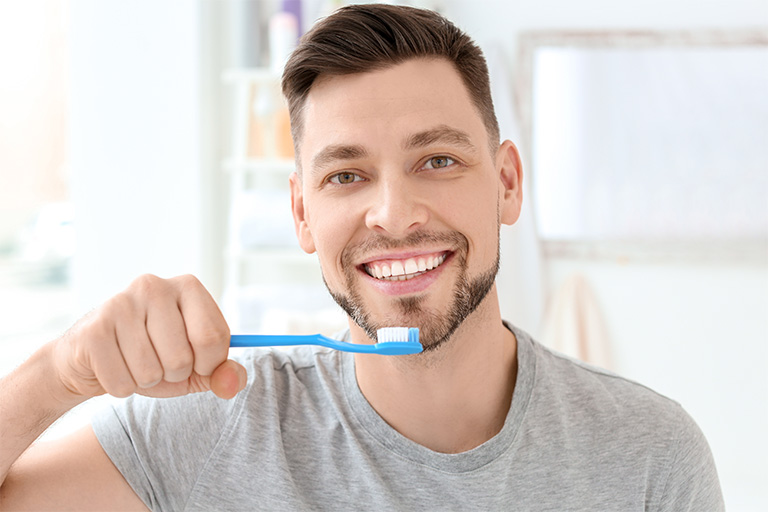
At Chelmsford Dental Specialists Group, we know it’s not easy trying to prevent dental emergencies. Many instances and situations are out of your control; however, taking a proactive approach to lower your risk is essential. The steps we will discuss below don’t necessarily guarantee that a dental emergency won’t happen, but they do go a long way toward helping you keep your smile safe.
Maintain Six-Month Routine Visits
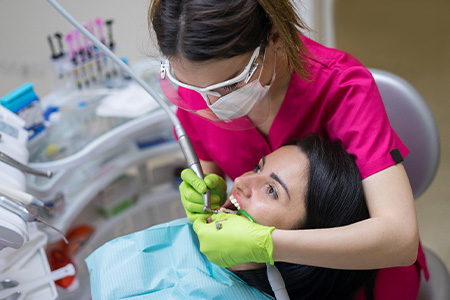
Seeing a member of our team for your six-month dental checkups and cleanings is just one way you can reduce your chances of developing a serious oral infection. Cavities, gum disease, and other serious problems can be caught early on during these visits, which can keep you out of the treatment chair and avoid restorative or emergency care in the future.
Practice Good Oral Hygiene

Regular brushing and flossing make up part of a good oral hygiene routine. When you add rinsing with an antimicrobial mouthwash, you create a trifecta of optimal oral habits. When brushing twice a day for two minutes, flossing at least once, and rinsing as instructed, you eliminate harmful bacteria that are known to cause decay, disease, and infection, all of which can result in a visit with your emergency dentist in Chelmsford.
Be Mindful of What You Eat

As the saying goes, “you are what you eat,” so if you want to be healthy, it’s best to create a diet that is full of nutrient-rich foods. Sugars and carbohydrates can be enjoyed in moderation, but the bulk of your daily meals and snacks should consist of fresh fruits and vegetables, leafy greens, low-fat dairy, lean proteins, and calcium-enriched food options. Not only are several of these items like miniature toothbrushes that can clear away food particles, but they can also safeguard your teeth and gums against harmful particles.
Wear a Mouthguard to Protect Your Teeth
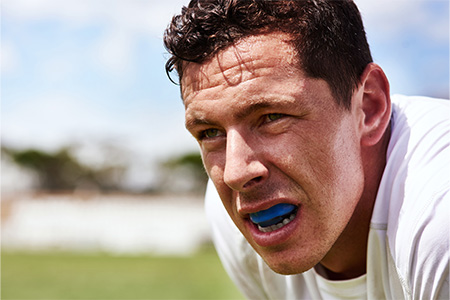
Sports-related dental injuries are common, which is why wearing a custom-made mouthguard is vital. If you or a loved one plays any kind of contact sport, you can lower your risk of a broken or knocked-out tooth with the help of this cushioned barrier or protection. By absorbing the pressure placed on your teeth during a hard hit, you can avoid serious damage to your smile. The same is true if you grind your teeth while you sleep. A custom nightguard can provide the same level of protection and reduce enamel erosion and jaw pain over time.
Use Tools to Open Packages, Not Your Teeth

Tooth enamel is incredibly strong, but it’s not incapable of becoming damaged. Chips, cracks, and breaks happen over time, especially when teeth are being used improperly. If you bypass scissors, pliers, and other tools to open a package with your teeth, you are risking your smile and the chances of needing emergency dentistry. It’s best to spend a few extra minutes trying to find the appropriate tool for the job so that you don’t accidentally damage one or more of your pearly whites (or gums)!
Understanding the Cost of Emergency Dentistry

We can only give you an estimate of what the cost of emergency dentistry in Chelmsford will look like once we have completed an examination of your mouth. The amount you pay will be determined by the nature of your emergency and the kind of treatment you require. Note that we’re happy to accept a variety of dental insurance plans, and we also offer CareCredit financing for patients who may want to break up the cost of their care.
Every Dental Emergency is Different

Treating a broken tooth is likely to look very different than addressing serious jaw pain or sensitive teeth – all of which are considered dental emergencies. This is why we can only provide a cost estimate after we see you for a thorough examination. We will make sure to evaluate the severity of the problem before discussing which restorative methods will be most effective.
These factors – restorative treatment and the severity of your injury – are the primary components of a cost breakdown; however, if custom restorations are required, the materials used will also be included.
Does Dental Insurance Cover Dental Emergencies?
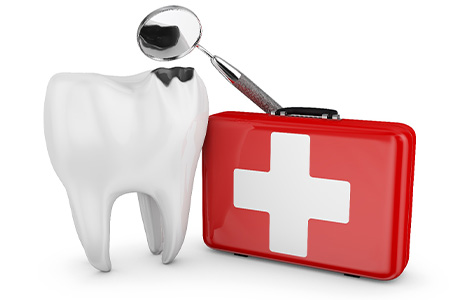
If you review your dental insurance plan, you will likely see that most companies provide one free emergency exam every year. The appointment, though, is unlikely to be the concern. Instead, the restorative care you require will be what you want to look at when it comes to eligible coverage. Generally, you can expect your insurance company to pay 50-80% as long as you have met your deductible. The remaining fees will be your responsibility.
Other Options for Making Dental Emergencies Affordable
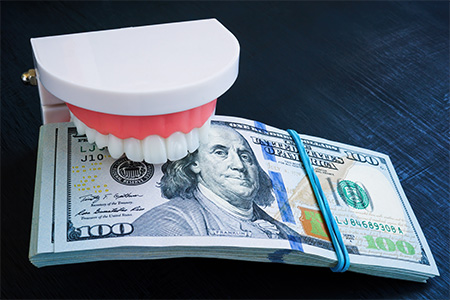
When private dental insurance is not available, our Chelmsford Dental Specialists Group is pleased to accept cash, check, and credit card. We also partner with CareCredit, a third-party financier that eliminates the stress and worry associated with dental care affordability. Eligible enrollees can choose from one of their many low-and no-interest plans, making it easy to pay off treatment over time. There is no need to pay out of pocket; instead, you’ll use your CareCredit just like a credit card, only there are no surprise fees or prepayment penalties.
Taking Care of Your Smile Can Save You Money
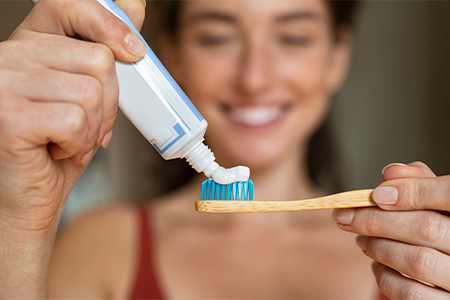
Certain dental emergencies cannot be avoided. Others, though, can be mitigated with a little bit of preventive awareness. Infections, for example, can be minimized if you practice good oral hygiene at home and continue to see your dentist for regular checkups and cleanings twice a year. Also, eating a healthy diet and giving up bad habits, like smoking and eating ice, can lower your risk. Doing so will not only help you maintain a damage-free smile, but you’ll also avoid spending money on restorative care provided by your emergency dentist.
Dental Emergency FAQs
Will My Toothache Eventually Go Away on Its Own?
Tooth pain can be caused by a number of underlying issues, like something lodged between a tooth or an infection that has made its way into the inner chamber where the pulp is located. If your pain is the result of something less serious, simply swishing with lukewarm salt water and flossing between your teeth may be able to help. However, if your pain persists, it’s likely that it won’t go away anytime soon. If persistent tooth pain does go away, it may signify the need for a tooth extraction because the nerves within the tooth have died.
Can the Emergency Room Remove a Tooth?
If you go to an emergency room at a hospital or an urgent care, the chances that they’ll be able to do a tooth extraction are minimal. The only way that they can do that is if they have a licensed dentist on-staff, which very few hospitals and urgent cares do. It’s more likely that they’ll provide you with antibiotics or some other medication and refer you to visit a dentist for a more thorough examination and proper treatment.
Is It Expensive to Repair a Chipped Tooth?
The great news is that if you accidentally chip a tooth, it’s not difficult for an emergency dentist in Chelmsford to fix! With a technique called dental bonding, our team at Chelmsford Dental Specialists Group can delicately rebuild the small missing portion of your tooth using the same material we use to fill cavities. The material is able to fuse with your natural tooth enamel to create a durable, lasting repair that can withstand eating your favorite foods.
What Should I Do if I Knocked Out My Tooth?
Accidentally knocking out one of your teeth can be scary, shocking, and after any shock has subsided, uncomfortable. The first step you should take is to call our office. Then, find your knocked-out tooth, being sure to only handle it by the crown (avoid touching the roots), and gently rinse it under cool water (making sure the attached tissues remain connected). Store your tooth in a container of milk and bring it to your emergency dental appointment.
Is It Safe to Repair Dentures with Superglue?
The short, sweet and definitive answer to this question is no! You should never try to repair your dentures on your own if they break. It can cause oral infections, discomfort, and disappointment because they simply won’t be as effective. Our team can help repair your dentures if that’s possible, or if you need to have them replaced, we can provide you with a fully functional, beautiful new prosthetic.



Enhance Your Smile with Chelmsford Dental Specialists Group
Toothaches
Is My Toothache a Dental Emergency? Toothaches are tricky because they can range from minor discomfort to intense, throbbing pain. If your toothache is severe, lasts more than a day, or is accompanied by swelling, fever, or sensitivity to temperature, it’s likely an emergency. These symptoms could be a sign of an underlying infection or abscess that needs immediate treatment.
How You Should Handle a Toothache:
- Rinse your mouth with warm salty water.
- Floss gently to remove any trapped food or debris.
- Take over-the-counter pain relievers if needed.
- Avoid chewing on the affected side of your mouth.
How We Treat Toothaches: At Chelmsford Dental Specialists Group, we’ll start with a full exam and digital X-rays to identify the root cause of your discomfort. Depending on the diagnosis, treatment may involve a filling, crown, root canal, or draining an abscess. In most cases, if an infection is present, we’ll also need to prescribe antibiotics.
Regardless of the cause or the method of treatment, we’ll relieve your pain quickly and guide you through your next steps for full recovery.
Chipped Teeth
Is a Chipped Tooth a Dental Emergency? A small chip might not seem urgent, but if it’s sharp, painful, or exposes the inner tooth, it should be treated as soon as possible. Even minor chips can lead to more damage—either to the tooth itself or to the soft tissues in your mouth—if left untreated.
How You Should Handle a Chipped Tooth:
- Save any pieces if possible and bring them to your appointment.
- Rinse your mouth with warm water.
- Apply dental wax (or sugar-free gum in a pinch) to cover any sharp edges.
- Avoid chewing hard foods or using the tooth.
How We Treat Chipped Teeth: At our Chelmsford practice, we’ll smooth out small chips or use tooth-colored bonding to restore your tooth’s shape. For larger chips, we may recommend a veneer or crown to protect the tooth and restore your smile’s appearance.
Cracked Tooth
Is a Cracked Tooth a Dental Emergency? Yes, especially if you're experiencing pain when biting or if the crack extends below your gumline. If left untreated, a cracked tooth can worsen or become infected, so it’s best to get help as soon as you notice an issue.
How You Should Handle a Cracked Tooth:
- Rinse your mouth gently with warm water to wash away any residue or debris.
- Avoid chewing on that side of your mouth.
- Apply a cold compress in 15-minute intervals to reduce swelling and discomfort.
- Call our emergency dentist in Chelmsford as soon as possible.
How We Treat Cracked Teeth: We’ll first take you in for an emergency appointment and assess the extent of the crack using digital imaging. Minor damage may only need a crown or bonding. However, more severe cases might require a root canal or extraction. Our Chelmsford team will prioritize saving your tooth whenever possible.
Very Sensitive Teeth
Are very sensitive teeth a dental emergency? Mild sensitivity is one thing, but very sensitive teeth can be an urgent issue. Their pain often stems from serious problems like deep cavities, cracked teeth, or even gum disease. As a result, you should have a dentist diagnose and treat them as soon as possible.
How you should handle very sensitive teeth: To start, please call our office; our team will quickly book a visit for you if the situation is urgent. For less severe sensitivity, we can suggest lifestyle changes that’d help you manage your pain or soreness. Such tips include drinking warm water, avoiding certain foods, and taking over-the-counter pain relievers.
How we treat very sensitive teeth: We have several ways to treat very sensitive teeth, depending on their underlying causes. One method is to suggest special oral products – desensitizing toothpaste, prescription mouthwash, etc. – for mild cases. When the sensitivity is infection-related, we’ll advise that you get a tooth-colored filling or gum disease treatment.
Learn More About Tooth-Colored Fillings Learn More About Gum Disease TherapyKnocked-Out Tooth
Is a knocked-out tooth a dental emergency? A knocked-out tooth is one of the most severe oral issues, so it absolutely qualifies as an emergency. You’ll want to have it addressed quickly to avoid long-term damage to your appearance and health. I you don’t, you’ll likely lose your tooth and require costly dental work you might’ve avoided.
How you should handle a knocked-out tooth: Should you suffer a knocked-out tooth, you can do several things to handle it initially. The first step is to locate the tooth in question and hold it by its crown, as touching the roots would cause more damage. Next, rinse the pearly white and store it in some milk or saline solution. (A tooth preservation kit with an ADA seal of approval is also acceptable.) You can then take it to your dentist for follow-up care.
How we treat knocked-out teeth: If you see us promptly, we could potentially save your knocked-out tooth. Our team would simply need to re-implant it and see if it reintegrates with your smile. Otherwise, you’d have to consult us about tooth replacements – dental bridges, dentures, dental implants, etc. These prosthetics would help you avoid the side effects of tooth loss.
Learn More About Dental Bridges Learn More About Dentures Learn More About Dental ImplantsLost Filling or Crown
Is a lost filling or crown a dental emergency? Fillings and crowns never last forever, so losing either isn’t an emergency scenario. However, you should still have the missing part replaced by your dentist soon. Patients who lack a filling or crown face a higher risk of tooth infections.
How you should handle a lost filling or crown: If you’ve lost a dental crown, please locate it and bring it to our office; we can reseal it if it’s still functional. We can’t do the same for a missing dental filling, so please leave such a thing alone.
How we treat lost fillings or crowns: Our team can often recement a lost crown when it’s intact. That said, you may need a new filling or crown if the old one is lost or too damaged and weak.
Learn More About Tooth-Colored Fillings Learn More About Dental CrownsBroken Denture
Is a broken denture a dental emergency? As a matter of fact, a broken denture does count as a dental emergency. Wearing it as-is would likely injure your teeth, gums, and soft mouth tissues over time. To avoid that outcome, call your dentist if your denture’s teeth or base get damaged.
How you should handle a broken denture: Before anything else, avoid putting the broken denture in your mouth. Using it would just harm your mouth and put your oral health at even greater risk. From there, please don’t try to fix the device yourself; the attempt would worsen things. You should instead have a local and qualified dentist repair your replacement teeth.
How we treat broken dentures: Our practice has several ways to treat broken dentures, depending on their level of damage. When they’re only slightly broken, we’ll often fill any small chips or cracks with resin. We can also readjust a broken denture with a thorough reline if the damage is moderate. For severe cases, we’ll suggest replacing the device entirely.
Learn More About Dentures Learn More About Dental ImplantsLoose Permanent Tooth
Is a loose permanent tooth a dental emergency? Yes, a loose permanent tooth is a dental emergency. When “adult” teeth aren’t firmly rooted, they’re more likely to fall out from accidents or injuries. The resulting tooth loss would then create smile gaps that cause tooth decay, gum disease, or worse. Those gaps could also shift your other teeth until they also fall out.
How you should handle loose permanent teeth: You should first call us as soon as possible; quick treatment for a loose tooth can save it. Next, avoid touching or using the loosened area while you wait for care. You can also rinse your mouth with warm water to remove any nearby debris.
How we treat loose permanent teeth: Note that we’ll always try to save loose permanent teeth before looking at other options. In particular, we could provide a dental splint or perform other measures. Our team will only advise an extraction if the tooth simply can’t be saved. In that case, we’d remove the pearly white and place dental implants or bridges as substitutes.
Learn More About Tooth Extractions Learn More About Dental Implants Learn More About Gum Disease TherapyInjury to the Gums, Lips, or Tongue
Is an injury to the gums, lips, or tongue a dental emergency? When such an injury is deep or severe, it can become a dental emergency. A deep cut would likely bleed a lot and require urgent care to prevent complications. This sort of injury will even become likely if you play contact sports that involve collisions.
How you should handle an injury to the gums, lips, or tongue: Before anything else, please clean the injured area gently with water; doing so rinses debris from your mouth. You should then apply pressure with a clean washcloth (or gauze) until the bleeding stops. If there’s any swelling or pain, you can use an ice pack or cold compress to reduce the symptoms.
How we treat injuries to the gums, lips, or tongue: Assuming the wound isn’t too big, our dentists can clean and stitch it closed. However, visit an ER first if any bleeding doesn’t stop within ten minutes.
Jaw Pain
Is jaw pain a dental emergency? Though annoying and unpleasant, jaw pain isn’t often a dental emergency. It only becomes urgent if and when it becomes severe and chronic.
How you should handle jaw pain: Please call our office first, as we’ll share detailed instructions with you over the phone. Our team may advise that you take painkillers, use an ice pack (or cold compress) to reduce swelling, and so on. If you believe your jaw is broken or dislocated, we’ll also advise you to visit an ER; we’ll gladly fix up your smile afterward.
How we treat jaw pain: Depending on its source, we have several methods for treating jaw pain. The first is TMJ treatment that addresses issues with your jaw’s joints. When the pain stems from an impacted wisdom tooth, we’ll advise its extraction. If you broke or dislocated your jaw, we can fix damaged or lost teeth after your ER visit.
Learn More About TMJ Treatment Learn More About Wisdom Tooth ExtractionSomething Stuck Between the Teeth
An object stuck between teeth isn’t usually an emergency, as it’ll often come out on its own. However, don’t hesitate to see us if it’s causing you a lot of mouth pain. Our dentists can use their expert skills to dislodge the object without causing further issues. In the meantime, please don’t use tweezers or toothpicks; they’d likely cause more problems. Try flossing near the affected area or rinsing your mouth instead.


